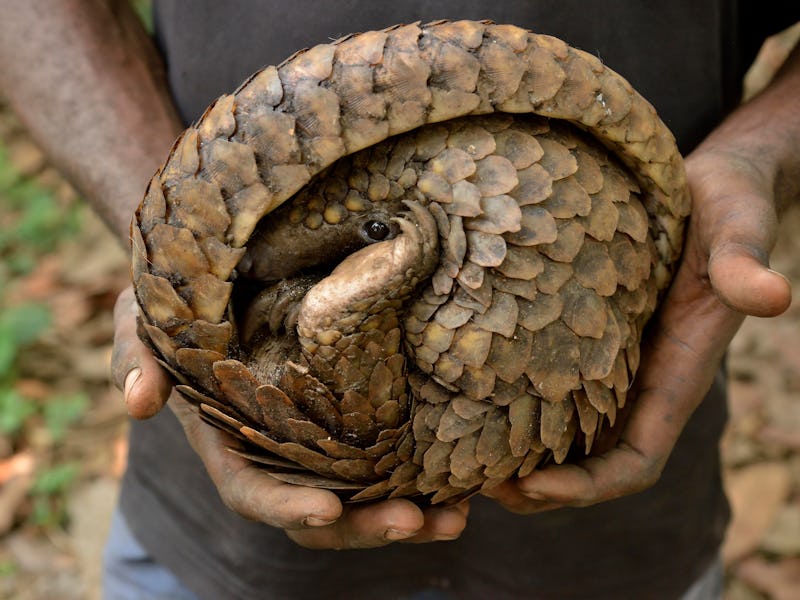An animal once linked to Covid-19 could be the key to better treatment
Researchers are still learning about the unique animal's immune response to the coronavirus.

A scaly, spikey-tailed, endangered mammal could be an important part of developing better treatment for the novel coronavirus that's spurred the ongoing global pandemic.
The peculiar pangolin has a strange immune response to Covid-19 that helps it stay safe from the disease. New research suggests that, at some point, humans hoping to protect themselves from the virus can try to mimic pangolins with medicine.
This study was published Friday in Frontiers in Immunology.
Pangolins have been linked to Covid-19 before. They're a candidate for the species that facilitated the transfer of the virus from an animal — possibly a bat — to humans.
Bats, research shows, have a diminished immune response to many viruses. That's part of the reason they're a particularly good virus host: They can carry a virus without getting too sick.
But little was known about pangolins' immune defenses. To close the gap, researchers analyzed genome data from pangolins to see if they had a similarly dampened immune response. The researchers compared genome sequences from pangolins to other mammals, like humans, dogs, cats, and cattle.
In turn, they discovered that pangolins can tolerate coronavirus, despite the fact that they lack a type of antiviral defense used by most other mammals.
"We found that, like bats, pangolins have a genetic defect in the response to several viruses probably including coronaviruses," corresponding author Leopold Eckhart, a researcher at the Medical University of Vienna, tells Inverse.
Specifically, pangolins lack two genes that typically trigger an immune response.
This is relevant for people because the way some individuals' immune systems respond to Covid-19 can underly why they become especially sick. In some cases, the body can overreact to infection, through what's called a cytokine storm.
Cytokines are small proteins that are involved in communication between cells in the body and are involved in inflammation. When a cytokine storm hits, the immune system overproduces immune cells and cytokines. In turn, the storm can overburden the body, and in some cases, damage the lungs, cause blood clots, or even lead to death.
The response indeed "causes more harm than the virus itself," Eckhart tells Inverse. And while this kind of response isn't the norm, it could occur in as many as 15 percent of Covid-19 patients.
This scaly mammal is giving researchers new clues about immune responses to Covid-19.
Where the pangolins come in — The fact that pangolins don't have the same response is intriguing because it means, in order to have survived for millions of years, they probably have some other, yet-unknown, natural defense.
"We believe that pangolins have another effective way to cope with virus infections," Eckhart says. "This so-far unknown response may be interesting for the development of new treatments of patients with viral infections."
There are already ongoing medical trials looking at the possibility of using drugs that suppress a specific cytokine could help treat certain cases of Covid-19. Meanwhile, research published in April looked at whether cytokine storms are driving the severity of Covid-19 in patients with other conditions, like diabetes.
But it's still too early to infer too much from the pangolin study: "We do not know yet if our findings can help to find new treatment," Eckhart says.
Still, he's hopeful. The new research doesn't prove, or disprove, that pangolins are a link between animals and humans carrying the virus that causes Covid-19.
However, "it is interesting to see that these animals have an antiviral defense different from that of other mammals," Eckhart says.
Separate research points to pangolins as a possible transmission source for the coronavirus — but nothing is certain yet. Despite laws protecting the endangered animals, humans poach and sell pangolins in wildlife markets — along with other animals like turtles, birds, reptiles, and bats.
Close proximity with humans, especially when humans push into animals' natural habitats, contributes to an animal's likelihood of spreading disease to humans, research has shown.
As for the pangolin's potential to contribute to Covid-19 treatment, Eckhart says more research can provide further insight. He hopes to see more research on the antiviral defense in pangolins, bats, and other animals, comparing those responses to humans.
"I think we can still get many new insights that could be relevant for medicine," Eckhart says.
Abstract: Zoonotic infections are an imminent threat to human health. Pangolins were recently identified as carriers and intermediate hosts of coronaviruses. Previous research has shown that infection with coronaviruses activates an innate immune response upon sensing of viral RNA by interferon-induced with helicase C domain 1 (IFIH1), also known as MDA5. Here, we performed a comparative genomics study of RNA sensor genes in three species of pangolins. DDX58/RIG-I, a sensor of cytoplasmic viral single-stranded RNA and toll-like receptors (TLR) 3, 7, and 8, which bind RNA in endosomes, are conserved in pangolins. By contrast, IFIH1 a sensor of intracellular double-stranded RNA, has been inactivated by mutations in pangolins. Likewise, Z-DNA-binding protein (ZBP1), which senses both Z-DNA and Z-RNA, has been lost during the evolution of pangolins. These results suggest that the innate immune response to viruses differs significantly between pangolins and other mammals, including humans. We put forward the hypothesis that loss of IFIH1 and ZBP1 provided an evolutionary advantage by reducing inflammation-induced damage to host tissues and thereby contributed to a switch from resistance to tolerance of viral infections in pangolins.